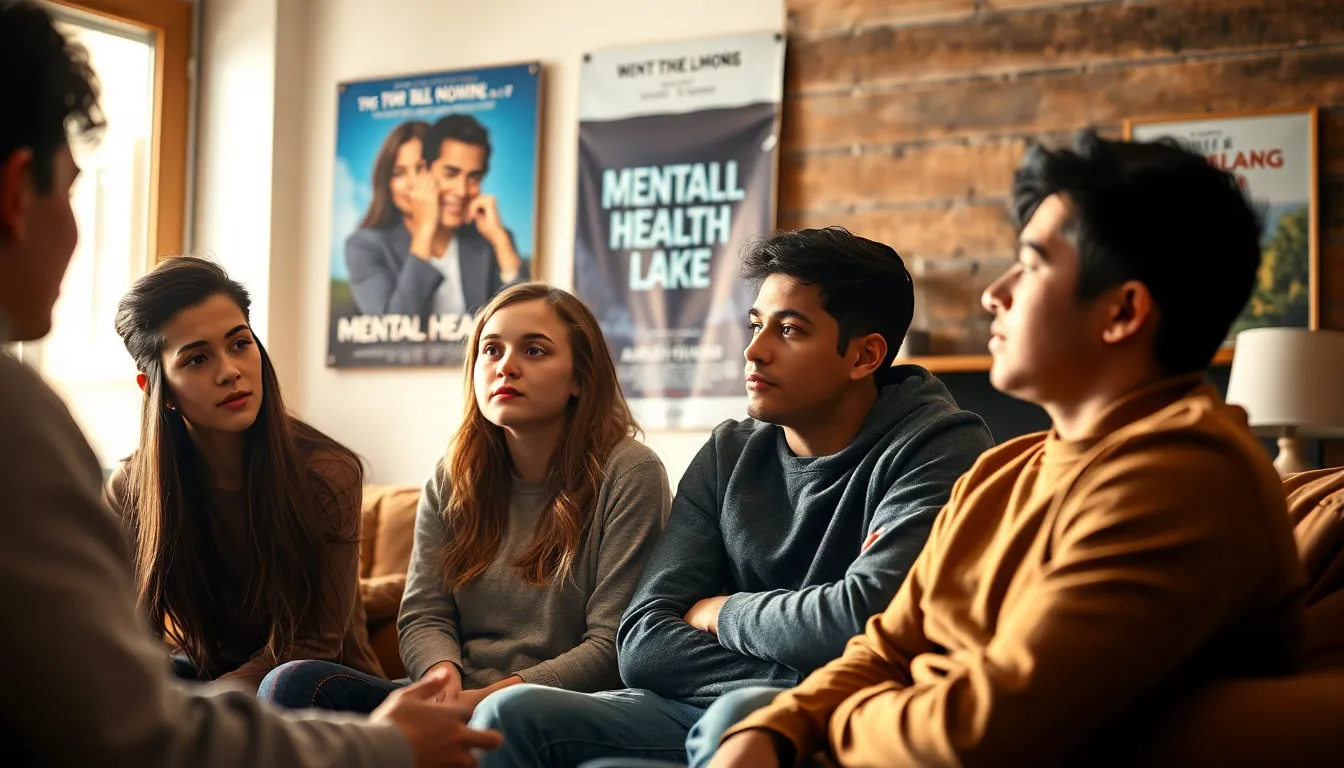Table of Contents
ToggleTeen years can feel like an emotional rollercoaster, complete with unexpected twists and turns. Movies that tackle mental health issues resonate deeply with young audiences, shining a light on struggles they might face. These films not only entertain but also spark essential conversations about feelings, friendships, and the ups and downs of growing up.
Imagine watching a flick that’s both relatable and eye-opening, where characters navigate the rocky terrain of adolescence while tackling mental health head-on. From laugh-out-loud moments to tear-jerking scenes, these films offer a blend of humor and heart. They remind teens that they’re not alone in their struggles and that seeking help is a sign of strength. So grab some popcorn and get ready to dive into a world where mental health takes center stage—because who said serious topics can’t come with a side of laughs?
Overview of Teen Mental Health Movies
Teen mental health movies tackle various emotional challenges adolescents frequently face. These films present relatable narratives that resonate with young viewers. By addressing issues such as anxiety, depression, and self-acceptance, they create awareness and promote understanding. Films like “The Perks of Being a Wallflower” emphasize the importance of friendships in healing and self-discovery.
Many movies incorporate humor alongside serious themes, making them engaging and insightful. “To the Bone” explores the struggles of eating disorders while fostering empathy and compassion. These stories remind viewers that searching for help signifies strength, not weakness.
Inclusivity in these films highlights diverse experiences, ensuring every teen finds some reflection of their journey. “A Star Is Born” showcases the impact of substance abuse and mental illness on relationships, encouraging open discussions about addiction.
Accessible narratives help de-stigmatize mental health conversations. When teens see themselves represented on screen, they often feel less isolated in their struggles. Films resonate with audiences by blending raw emotion with lighthearted moments, striking a perfect balance.
As these movies spark vital discussions, they also empower teens to reach out for support. Whether through friendships or professional help, these stories illustrate that connection plays a crucial role in mental well-being. They provide valuable insights into the importance of resilience and understanding in navigating the tumultuous teenage years.
Impact of Movies on Teen Mental Health

Movies often play a crucial role in shaping teens’ perceptions of mental health. Engaging narratives promote dialogue around emotional challenges, providing both comfort and understanding.
Positive Representation
Positive representation in teen mental health movies fosters validation for viewers. Characters who navigate struggles like anxiety or depression can resonate deeply with young audiences. Films such as “The Perks of Being a Wallflower” showcase how supportive friendships aid healing. They reflect real-life challenges, illustrating that sharing experiences is essential. Authentic portrayals encourage anxious teens to seek connections, knowing they’re not isolated. Through these stories, viewers recognize their emotions and learn coping strategies. As relatable characters face their issues, they empower teens to embrace vulnerability.
Harmful Stereotypes
Harmful stereotypes can negatively impact how teens view mental health. Movies that oversimplify or misrepresent mental illnesses contribute to stigma. Characters depicted solely as troubled or dangerous reinforce misconceptions surrounding mental health. Such portrayals can lead to feelings of shame and isolation for those affected. Furthermore, films lacking depth may suggest mental health struggles are merely dramatic plot points. Avoiding nuanced storytelling risks invalidating real emotions, hindering teens from seeking help. Educators and parents need to guide conversations about these stereotypes for better awareness. Encouraging critical engagement can help viewers dissect harmful narratives.
Notable Teen Mental Health Movies
Various films delve into the complexities of teen mental health, offering relatable narratives that resonate with young audiences. These films cover a spectrum of emotional challenges, showcasing the significance of friendship, self-acceptance, and the journey toward healing.
Title 1: The Perks of Being a Wallflower
The Perks of Being a Wallflower captures the essence of teenage struggles through the eyes of Charlie, a shy high school freshman. Themes of friendship, trauma, and mental illness permeate the story. The film emphasizes the healing power of relationships while addressing issues like anxiety and depression. Viewers witness Charlie’s transformation as he finds acceptance and understanding among his friends. Through poignant dialogue and heartfelt moments, the film fosters empathy and encourages discussions about mental health among teens.
Title 2: To the Bone
To the Bone focuses on Ellen, a young woman battling anorexia. The film explores the complexities of eating disorders and the journey toward recovery. It highlights the importance of seeking help and the role of support systems in overcoming mental health challenges. Themes of self-acceptance and family dynamics unfold as the characters navigate difficult conversations. This film encourages viewers to empathize with those facing similar struggles, emphasizing that healing takes time, patience, and connection.
How to Use Movies as Discussion Starters
Movies provide an excellent platform for initiating discussions about mental health among teenagers. Engage teens by watching relevant films together and encourage them to express their thoughts. Discuss specific scenes or characters to help them relate to their experiences.
Start conversations with open-ended questions. For example, ask, “What did you think about Charlie’s struggles in ‘The Perks of Being a Wallflower’?” This approach invites them to share personal feelings and insights. Similarly, encourage them to compare their experiences with those portrayed in the films.
Foster a safe environment where teens feel comfortable sharing without judgment. Use humor when appropriate, as it can lighten the mood and make serious topics less daunting. Relate film narratives to real-life scenarios, highlighting the themes of friendship, acceptance, and mental health challenges.
Provide context by sharing relevant statistics about teen mental health. For instance, indicate that 1 in 5 teens experiences a mental health challenge during adolescence. This kind of data can reinforce the importance of discussing these issues.
Invite them to suggest their favorite movies that deal with mental health themes. Their choices can reflect their feelings and offer insights into their struggles. Create a list of films to watch together, prioritizing those that spark important conversations.
Encourage reflection after viewing. Ask them to journal their thoughts or discuss them in groups, helping to solidify their understanding and feelings. Facilitate ongoing dialogue by revisiting themes in different films, creating a continuous conversation about mental health and well-being.
Recommendations for Future Films
Filmmakers should aim to include narratives that reflect the complexities of teenage mental health struggles. Diverse characters will enrich storytelling, ensuring representation of various backgrounds and experiences. Authentic portrayals of mental health conditions must prioritize accuracy to avoid perpetuating stereotypes.
Storylines that emphasize the importance of support systems are essential. Including themes of resilience and recovery can inspire hope among viewers. More films could explore non-traditional methods of coping, such as creative therapies or peer support groups, to increase relatability.
Comedy can effectively address serious topics without diluting their importance. By blending humor with serious themes, filmmakers can create a welcoming atmosphere for teens to engage with difficult subjects. Introducing lighthearted moments can help maintain emotional balance while discussing challenges like anxiety or depression.
Realistic endings are crucial as they reflect the complexities of recovery. Avoiding overly simplistic resolutions can provide audiences with a more grounded understanding of the issues addressed. Additionally, showcasing the journey rather than just the destination promotes ongoing conversations about mental health.
Collaborations with mental health professionals during production can enhance film authenticity. Professionals can provide valuable insights into the nuances of mental health experiences, supporting the creation of informed narratives. Integrating expert perspectives ensures that films resonate positively with audiences.
Overall, future films should challenge stigma around mental health by fostering conversations. Encouraging open discussions can empower teens to share their experiences, promoting a culture of support. By focusing on sensitivity and authenticity, movies can effectively contribute to the mental health dialogue among adolescents.
Teen mental health movies play a vital role in shaping understanding and empathy among young audiences. They create a safe space for discussions about complex emotions and experiences. By portraying relatable characters and authentic struggles, these films encourage teens to seek help and connect with others.
As filmmakers continue to explore diverse narratives, the potential for positive impact grows. Engaging with these stories not only fosters awareness but also empowers teens to confront their challenges. Ultimately, the blend of humor and heartfelt moments in these movies can inspire resilience and hope, reminding viewers that they are never truly alone in their journey.




